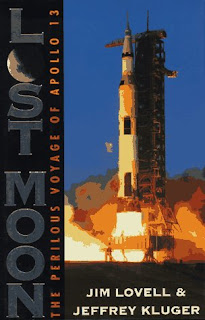Summary:
In April 1970, during the glory days of the Apollo space
program, NASA sent Navy Captain Jim Lovell and two other astronauts on
America's fifth mission to the moon. Only fifty-five hours into the flight of
Apollo 13, disaster struck: a mysterious explosion rocked the ship, and soon
its oxygen and power began draining away.
What begins as a smooth flight is transformed into a hair-raising
voyage from the moment Lovell calls out, "Houston, we've got a
problem." Minutes after the explosion, the astronauts are forced to
abandon the main ship for the lunar module, a tiny craft designed to keep two
men alive for just two days. But there are three men aboard, and they are four
days from home. As the hours tick away, the narrative shifts from the crippled
spacecraft to Mission Control, from engineers searching desperately for
solutions to Lovell's wife and children praying for his safe return.
The entire nation watches as one crisis after another is met
and overcome. By the time the ship splashes down in the Pacific, we understand
why the heroic effort to rescue Lovell and his crew is considered by many to be
NASA's finest hour.
Lost Moon is the true story of a thrilling adventure and an
astonishing triumph over nearly impossible odds. It was a major
Oscar(R)-nominated motion picture directed by Ron Howard and starred Tom Hanks
and Kevin Bacon.
Review:
On the outside, Lost
Moon by Jim Lovell and Jeffrey Kluger tells story about three astronauts
that almost didn’t make it back from
space, but inside this book is the deeper story of a nation bent on beating another,
creating a paranoia and fear beneath the umbrella of Communism and The Cold
War. Russia started this cold competition with Sputnik, leading to greater space
flights before we could catch up.
Russia lost its lead on July 20th, 1969 when our
Apollo 11 landed on the moon. Even if folks don’t know many of the details,
most people know what Neil Armstrong said when his feet touched the moon – “That’s
one small step for man, and one giant leap for man-kind.” After, Russia lost a
craft on the moon and gave up. We won. The days that followed were the glory
days of the Apollo space program. And then, disaster struck with Apollo 13. Astronauts
Lovell, Swigert, and Haise lost oxygen due to an unexplained explosion.
The next line we remember as a nation about the NASA space
flights are Jim Lovell’s words, “Houston, we have a problem.” Now, in as much
as heroism followed Armstrong when he landed on the moon and captivated plethora
amounts of fans; we should also follow Lovell, Swigert and Haise. As these men
continued to lose power and oxygen; they remained calm brainstorming solutions
with Houston back home until they landed in the ocean back on earth.
Lost Moon is
loaded with engineering jargon, which I admit took my literary mind more than a
second to grasp tiny fragments of the engineering genius it took to get home,
meanwhile oxygen levels minimalized. The understandable knowledge that held my
attention revolved around the central idea held by the three men – oxygen levels
could support two, not three of them, if they couldn’t figure a way to power
home soon. This kind of deadline kept you reading.
The other information exposing the dangers of space flight to
these astronauts/heroes happened prior to their flight. Not long before Lovell
jumped aboard Apollo 13; he lost his friend Ed White to a fire that started in
the cockpit of a rocket during training. Before I read this book, I took our
incredible space flights for granted. They fell in line with a whole other list
of heroic activities due surfeit amounts of respect and awe, but with my little
understanding of the complications, problems and pure brilliance that made
history.
Other than awakening a further understanding of space
flight, Lost Moon, did a more than
adequate job on the characterization of Jim Lovell. This book made him come to
life with small details painting him human. For example, when Lovell was a kid
he stumbled into a corporate office asking for potassium nitrate, Sulphur, and
charcoal, so that he and his seventeen-year-old friends could build a rocket.
Just so happens though, unless these three ingredients are packed right they
create gunpowder - not rocket fuel.
This told me two things about Lovell making me root for him:
1) Lovell loved flying from an early age, and followed that dream. 2) Because
Lovell didn’t know about the gunpowder, he had a lot to learn, and so he did. He
played a massive part in saving his friends, Swigert and Haise, flying home in
Apollo 13.

